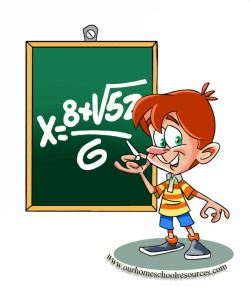Homeschool Math Curriculum for 4th Grade
This page provides you with a sample homeschool math curriculum for 4th grade kids. It is divided into several weeks. You can adjust it according to your needs...
Week 1-2: Place Value and Number Sense
- Recognize, read, and write numbers up to 1,000,000.
- Understand the place value of thousands, ten thousand, and hundred thousand digits.
- Compare and order multi-digit numbers.
Week 3-4: Advanced Addition and Subtraction
- Add and subtract multi-digit whole numbers.
- Solve word problems that involve addition & subtraction with regrouping.
- Practice mental math and estimation strategies.
Week 5-6: Introduction to Multiplication of Multi-digit Numbers
- Multiply larger numbers (up to four digits by one digit and two digits by two digits).
- Utilize area models and the standard algorithm.
Week 7-8: Introduction to Division
- Dividing numbers with up to 4 digits by 1-digit divisors.
- Understand remainders in the context of word problems.
Week 9-10: Fractions I
- Understand fraction equivalence and comparison.
- Decompose fractions into the sum of smaller fractions.
- Introduction to mixed numbers.
Week 11-12: Fractions II
- Adding and subtracting fractions with like denominators.
- Multiply a fraction by a whole number.
Week 13-14: Geometry I
- Lines, angles, and classifying two-dimensional figures.
- Recognize and measure angles.
Week 15-16: Decimal Notation
- Understand decimal notation for fractions, which has denominators of 10 and 100.
- Relate decimals to fractions.
- Compare decimal values.
Week 17-18: Measurement I - Area and Perimeter
- Develop and apply formulas for the area and perimeter of rectangles.
- Solve problems involving areas of complex shapes by decomposing them.
Week 19-20: Measurement II - Converting Units
- Convert larger units to smaller units within the metric system and U.S. customary measurements.
- Solve multi-step word problems involving distances, intervals of time, volumes, masses, and money.
Week 21-22: Geometry II
- Understand and identify lines of symmetry.
- Understand the concept of angles and protractors.
Week 23-24: Fractions III
- Understand adding and subtracting mixed numbers with like denominators.
- Practice converting between mixed numbers & improper fractions.
Week 25-26: Decimals - Operations
- Add and subtract decimals to hundredths.
- Use models and strategies to solve decimal word problems.
Week 27-28: Multiplication and Division Application
- Solve multi-step word problems with the use of all four operations.
- Interpret remainders based on the context of the problem.
Week 29-30: Geometry III
- Understanding coordinate planes.
- Plotting points on coordinate grids.
Week 31-32: Patterns and Algebraic Thinking
- Recognize and generate arithmetic patterns.
- Understand the use of letter variables in mathematical expressions.
Week 33-34: Data and Graphing
- Solve problems using data from line plots.
- Interpret information presented in graphs.
Week 35: Review
- Revisit challenging concepts and engage in comprehensive math activities or projects.
Week 36: End-of-Year Assessment and Celebration
- Informal assessment or review games to gauge understanding of the year's concepts.
- Celebrate progress with fun math activities, challenges, and games.
Consistent practice is vital. Hands-on activities, math-based games, and real-world problems can help consolidate learning. Adjust the curriculum based on the child's pace, strengths, and needs.

What's in our homeschool...
Finding the right homeschooling curriculum that best fits my children's needs was one of the most significant challenges I had when we first started our journey. I found different curricula that best suit my children's needs...
As a parent, a homeschooled reading curriculum was at the top of my mind when we started homeschooling. English was one of the requirements in our state, and what better way to learn English than to read. Getting kids interested...
There are various homeschool math curricula that you can use in your homeschooling. As for me, I use Mathletics and Khan Academy for my children. They are beneficial for us. I use Mathletics for our homeschool math ...
A homeschool art curriculum has a lot of benefits to children. This includes the development of language and communication skills, dexterity, motor skills, creativity, focus, persistence, problem-solving skills, collaboration...
Our homeschool science curriculum includes a few different things. Science is really a wonderful thing to be studied and explored. When we introduce our children to various opportunities for science learning, they will experience...


